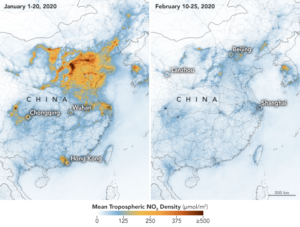Economic disruption from strict confinement measures in China, where the coronavirus disease 2019 (COVID-19) outbreak began, and in Italy, Europe’s most affected nation, have led to significant decreases in air pollution as fewer vehicles are driven and industrial emissions fall. A preliminary calculation suggests that tens of thousands of premature deaths from air pollution may have been avoided by the cleaner air in China – far higher than the COVID-19 deaths.
According to the Centre for Research on Energy and Clean Air (CREA), pollution fell sharply across China in the four weeks after January 25, 2020, when several regions shut down in response to the outbreak. The level of fine particulate matter (PM2.5), small pollution particles that pose a danger to human health, fell by 25 per cent, while nitrogen dioxide, produced mainly by diesel vehicles and industrial operations, dropped by 40 per cent.
Environmental experts across the globe and media outlets such as The Guardian and ScienceAlert are monitoring the results of the recent air studies. However, no one is claiming the pandemic is good for health and it is too early for conclusive studies to be complete. Other indirect health impacts of COVID-19, via lost income and lack of treatment for other illnesses, are expected to take a toll.
On March 8, 2020, Marshall Burke, a Stanford University environmental resource economist, revealed some calculations about the recent air pollution drop over parts of China and potential lives saved. According to Burke, even conservatively, it’s very likely that the lives saved locally from the reduction in pollution exceed COVID-19 deaths in China.

“Given the huge amount of evidence that breathing dirty air contributes heavily to premature mortality, a natural – if admittedly strange – question is whether the lives saved from this reduction in pollution caused by economic disruption from COVID-19 exceeds the death toll from the virus itself,” said Burke in his blog, G-Feed.com, which is focused on global food, environment and economic dynamics.
The two months of pollution reduction, Burke calculates, has probably saved the lives of 4,000 children under age five and 73,000 adults over 70 in China. That’s significantly more than the current global death toll from the virus.
Since the second largest number of COVID-19 cases were confirmed in Italy, the country put in place strict quarantine measures. Satellite data over northern Italy have now shown a large drop in air pollution. Satellite images taken by the European Space Agency (ESA) from January 1, 2020 to March 11, 2020 showed nitrogen dioxide dropping dramatically, as evidenced in this video.
“The decline in nitrogen dioxide emissions over the Po Valley in northern Italy is particularly evident,” said Claus Zehner, ESA’s Copernicus Sentinel-5P mission manager.
Peer-reviewed studies measuring the health impact from reduced emissions will shed more light on the dangers of widespread air pollution. These preliminary data reports demonstrate that global health disasters are an opportunity to assess which aspects of modern life are absolutely necessary, and what strategies might be worth implementing for the sake of the environment and human health.
For further information on CREA, click here.
Featured images from the European Space Agency.








